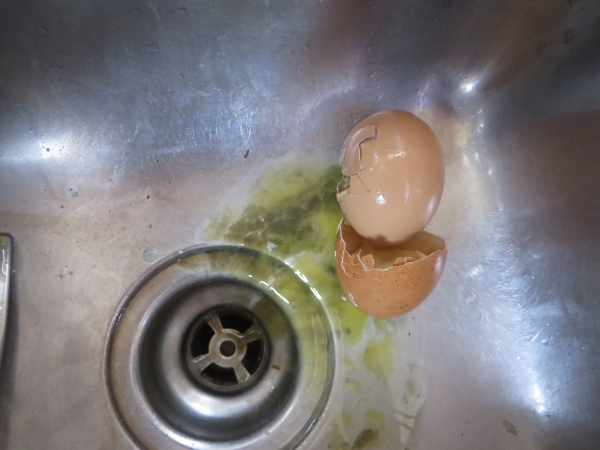Rotten Eggs and Other Smells
/One of the things about boats is they smell. Sometimes it's the garlic and onion you're sauteing, but more likely it's something else or a combination of “something elses”. My sister, Lin, always hugs me rather tenuously when we first arrive home after a long stay on the boat and wrinkles her nose. “Boat smell”, she pronounces. We don't smell it until we've been away from the boat for a few days and then it's very evident. It's a mix of diesel and mildew, the last meal you cooked, head (toilet) smells and the bilge among other things. It's certainly not Chanel #5. Yesterday, there was a strong smell on the boat, emanating from the galley, not the head. We've been taking dips and rinsing off daily, so it wasn't us. Except when it rains, we've had all the hatches and ports wide open, airing Cups out. I finally tracked it down. Two adjoining eggs in our stash had hairline cracks on their bottoms (maybe one cracked the other...misery loves company?) and when I lifted them out of the carton, they exploded most dramatically and aromatically in the sink. Whew! Rotten eggs! It took awhile for that sulfur smell to dissipate, believe me!

Rotten eggs are pretty infrequent unless an unnoticed crack sneaks by as it did recently. Other smells on the boat, however, can be a challenge. The head can definitely be a culprit. It gets cleaned frequently and I use one of those stick-on, gel-type deodorizers in the bowl, but it's just not enough. Every month or so, we pump a bucket of bleach water through the system and let it set for awhile and then pump it out. After awhile, even bleach water isn't enough. Calcification builds up in the hoses and that becomes a whole other issue to be taken care of. Once a year, David pumps a hydrochloric acid/water solution through the system which dissolves the lime and, in combination with our other maintenance, it seems to keep head odors at bay.
The bilge collects everything that finds its way to the bottom of the boat. The smells contain fermenting salt water, mold, mildew, diesel … a lovely bouquet that assaults your senses especially when the boat's been closed up for awhile. We usually dump a bucketful of soapy water down there and let it slosh around for awhile before turning on the bilge pump once we're a ways out to sea.
Diesel smells were strong during our recent passage from Trini to Culebra. With particularly rolly seas, David discovered that the starboard fuel tank was leaking around the inspection plate gasket. Not much diesel escaped, but what did was quite pungent. Typically, boats smell of diesel in the same way cars sometime smell of gasoline and certainly your garage smells of auto fuel. The problem is, you don't usually park your car engine in the middle of your kitchen or living room, so it's not a problem. Our engine is smack dab in the middle of the boat … next to the galley and salon. Stopping the leak was a #1 on the fix list and adequate ventilation is taking care of the rest of the problem.
Mold and mildew can be kept to a minimum, but if you're in the tropics, it's hard to remove them entirely. We have such a mix of clothing for the different climates we encounter, some clothes are always stowed away in lockers. When we haul them out, they smell like “boat”, mostly due to mold and mildew. We try to hang them out on sunny days with a light breeze and wash down the lockers with vinegar and water while the clothes are airing. We left a dehumidifier on 24x7 when we left Cups alone in Trinidad and it was well worth the expense. Thankfully, there was no noticeable mildew or mold when we returned. The closed up boat, however, still smelled rather unpleasant until we opened all the ports and hatches and got some air circulating.
Here's where I'm really sorry there are no sensory “smell chips” so that I can share the delightful smells that can emanate from a boat with you. Believe me, it's something you're probably glad to have missed.

